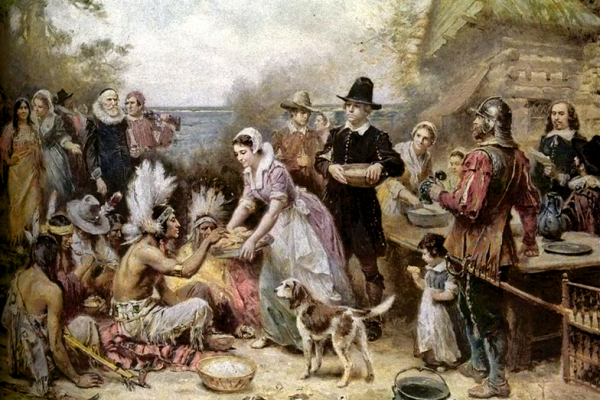At the expense of being called a cynic, a hater, an angry Asian man, and [insert your words here], I still think it’s important and necessary to be mindful of the history, context, and stories of why we mark or celebrate certain “events.”
For example: Thanksgiving.
Let’s be honest:
The notion of being grateful and thankful is a beautiful thing. It’s a concept that transcends any gender, race, age, religion, etc.
But honestly, I have a difficult time acknowledging Thanksgiving — let alone, celebrate Thanksgiving. I’ve been checking my heart for years why I can’t just go with the flow and to see the “redemptive” aspect of present day Thanksgiving.
Present day Thanksgiving — in its most minimal perspective — is to be thankful. That’s it. Gather with family and friends and go crazy on food. Football. Good memories. Early 5am treks to your favorite stores to get that crazy deal on Black Friday. And on and on.
But something’s off when we engage — directly or indirectly — in rewriting history. Or here it is: The loaded words ... wait for it ... wait for it …
Revisionist history.
Thanksgiving — in its original intent — was to mark a good harvest in the plight of the early Pilgrims. While there are disputes about specific dates, most point to the first gathering to the Fall of 1621 where the Pilgrims and [some] local Indians gathered (fewer than 100) to celebrate a feast. Most are in agreement that the Indians were invited simply because the Pilgrims knew that they would have died had it not been for the help of the local Indians.
But things changed: Illegal Aliens or European Invasion.
While it is true that we’re not entirely sure all the specific details, those that we would now categorize as “illegal aliens” not only came without invitation but they came to take over. In fact, beyond the first joint “Thanksgiving,” there were no further meals of mutual peace, dependence, and friendship.
“Heathen Captives”
Eventually, what became common liturgy or words of thanksgiving involved the recognition and celebration of the colonists’ victory of “oppression” of the “heathen captives.”
Unfortunately, sources for news, media, and bloggers were pretty rare back then. The early arrivals of European invasion resulted in the deaths of 10 to 30 million native Indians.
Ten to 30 MILLION people.
What is the context of Thanksgiving?
The beginning of one of the worst human injustice — the suppression, oppression, and near annihilation of the Native Indians. In one word:
Genocide
There are too many statistics and stories to cite. But they are brutal.
I’m not suggesting we not be thankful. But if it were up to me, I’d repeal the official day of Thanksgiving that was sanctioned by Congress because no matter how we want to re-tell or re-write that story, we are marking an event of injustice.
In removing this day, I’d encourage the whole country to express sorrow for such a grave injustice to the Native Indians and create events and various forms of curriculum in parallel. I’d express gratitude and celebration of the story and legacy of the native Indian people. And I’d put into law that ensures reparation for every single descendant of Native Indians. Furthermore, I’d create a fund to guarantee 100% funding to college for any descendants of Native Indians. This is just for starters….
In my opinion, our treatment of the Native Indians is one of the greatest human tragedies and to ignore its story and context may be the pinnacle of historical revisionism.
What about Thanksgiving?
Move it to another month. Write a better story. Live a better story.
Lastly, watch this…
http://www.ted.com/talks/view/lang/en//id/1004
[This column originally ran on Eugene's blog.]
Eugene Cho, a second-generation Korean-American, is the founder and lead pastor of Quest Church in Seattle and the executive director of Q Cafe, an innovative nonprofit neighborhood café and music venue. You can stalk him at his blog, Twitter or his Facebook Page. Eugene and his wife are also the founders of , a movement of people, stories, and actions to alleviate extreme global poverty.
Got something to say about what you're reading? We value your feedback!
